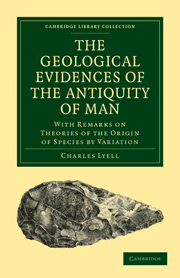 The Geological Evidences of the Antiquity of Man
The Geological Evidences of the Antiquity of Man Published online by Cambridge University Press: 29 August 2010
SOME of the opponents of transmutation, who are well versed in Natural History, admit that though that doctrine is untenable, it is not without its practical advantages as a ‘useful working hypothesis,’ often suggesting good experiments and observations, and aiding us to retain in the memory a multitude of facts respecting the geographical distribution of genera, and species, both of animals and plants, and the succession in time of organic remains, and many other phenomena which, but for such a theory, would be wholly without a common bond of relationship.
It is in fact conceded by many eminent zoologists and botanists, as before explained, that whatever may be the nature of the species-making power or law, its effects are of such a character as to imitate the results which variation, guided by natural selection, would produce, if only we could assume with certainty that there are no limits to the variability of species. But as the anti-transmutationists are persuaded that such limits do exist, they regard the hypothesis as simply a provisional one, and expect that it will one day be surperseded by another cognate theory, which will not require us to assume the former continuousness of the links which have connected the past and present states of the organic world, or the outgoing with the incoming species.
To save this book to your Kindle, first ensure no-reply@cambridge.org is added to your Approved Personal Document E-mail List under your Personal Document Settings on the Manage Your Content and Devices page of your Amazon account. Then enter the ‘name’ part of your Kindle email address below. Find out more about saving to your Kindle.
Note you can select to save to either the @free.kindle.com or @kindle.com variations. ‘@free.kindle.com’ emails are free but can only be saved to your device when it is connected to wi-fi. ‘@kindle.com’ emails can be delivered even when you are not connected to wi-fi, but note that service fees apply.
Find out more about the Kindle Personal Document Service.
To save content items to your account, please confirm that you agree to abide by our usage policies. If this is the first time you use this feature, you will be asked to authorise Cambridge Core to connect with your account. Find out more about saving content to Dropbox.
To save content items to your account, please confirm that you agree to abide by our usage policies. If this is the first time you use this feature, you will be asked to authorise Cambridge Core to connect with your account. Find out more about saving content to Google Drive.